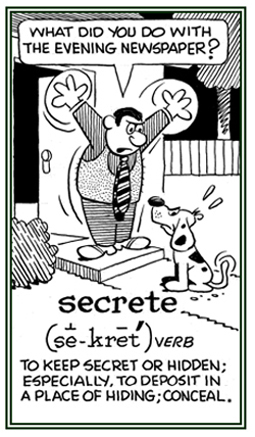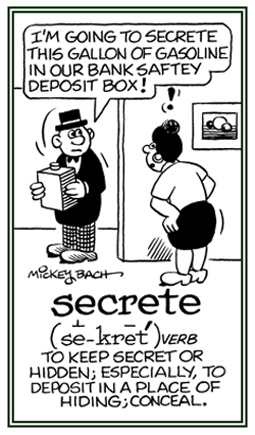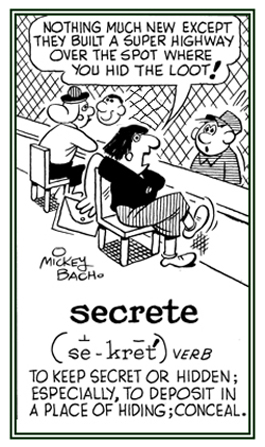cern-, cert-, cer-; cret-, creet-, cre-
(Latin: to separate, to sift, to distinguish, to understand, to decide, to determine; separated, separation, to set apart; the glandular extraction or the movement out of a natural substance)
Used to express the ability a person has to distinguish, or to perceive, something with the eyes and the mind. Related to crit-; as in criticize, diacritical, critique, etc.
2. Not consisting of distinct parts.
2. Excrement or matter excreted and ejected; that which is excreted or cast out of an animal body by any of the natural emunctories; especially, alvine (intestines), discharges; dung; ordure (solid excretory products evacuated from the bowels).
Emunctories are any organs, or parts of the body; such as, the kidneys, skin, etc, which serve to carry off excrementitious or waste matter.
2. Etymology: existing from about 1423, secretee, "quality of being secret"; from Old French secré, a variant of secret which is from Latin secretus, "set apart, withdrawn, hidden"; originally the past participle of secernere, "to set apart"; which came from se-, "without, apart" with the extended meaning of "on one's own".
2. Keeping information hidden from other people or to very few people and consequently quiet and secluded: "They lived in a secret location of the suburbs."
3. A special or unusual way of doing something to achieve a good result: "She shared her beauty secrets with the small group."
4. Something which cannot be explained: "There are many secrets of the universe and even of many aspects of nature here on Earth."
5. Etymology: anything that is secret is "separated" from others; hence, "put out of the way, hidden".
The word comes via Old French secret from Latin secretus, an adjectival use of the past participle of secernere, "to separate". This was a compound verb formed from the prefix se-, "apart" and cernere, "to separate".
From the 16th to the 18th centuries, secret was used as a verb, meaning "to hide", but it was then altered to secrete, based on the model of Latin secretus.
2. In the United States, an official who advises the President in various fields and who is selected by the President and is in charge of a particular department of the government; such as, Attorney General, Secretary of Agriculture, Secretary of Commerce, Secretary of Education, Secretary of Energy, Secretary of Health and Human Services, Secretary of Housing and Urban Development, Secretary of Labor, Secretary of State, Secretary of Interior, Secretary of Treasury, Secretary of Transportation, and the Secretary of Veterans Affairs. Is anyone missing?
3. Etymology: "a person entrusted with secrets", from Medieval Latin secretarius, "clerk, notary, confidential officer, confidant"; from Latin secretum, "a secret".
The meaning, "a person who keeps records, writes letters, etc."; originally, for a king, was first recorded in about 1400.
Cells, glands, and organs secrete chemical substances (enzymes or hormones) which are needed for physical processes in various parts of the body.
2. To put something in a hidden or secret place: Mike was keeping his assets secreted in a foreign bank account.Delores was secreting her savings in a special safe-deposit box in her local bank for greater security instead of at home.
3. Etymology, origin: from Latin secernere, "to set apart, to separate, to hide".




